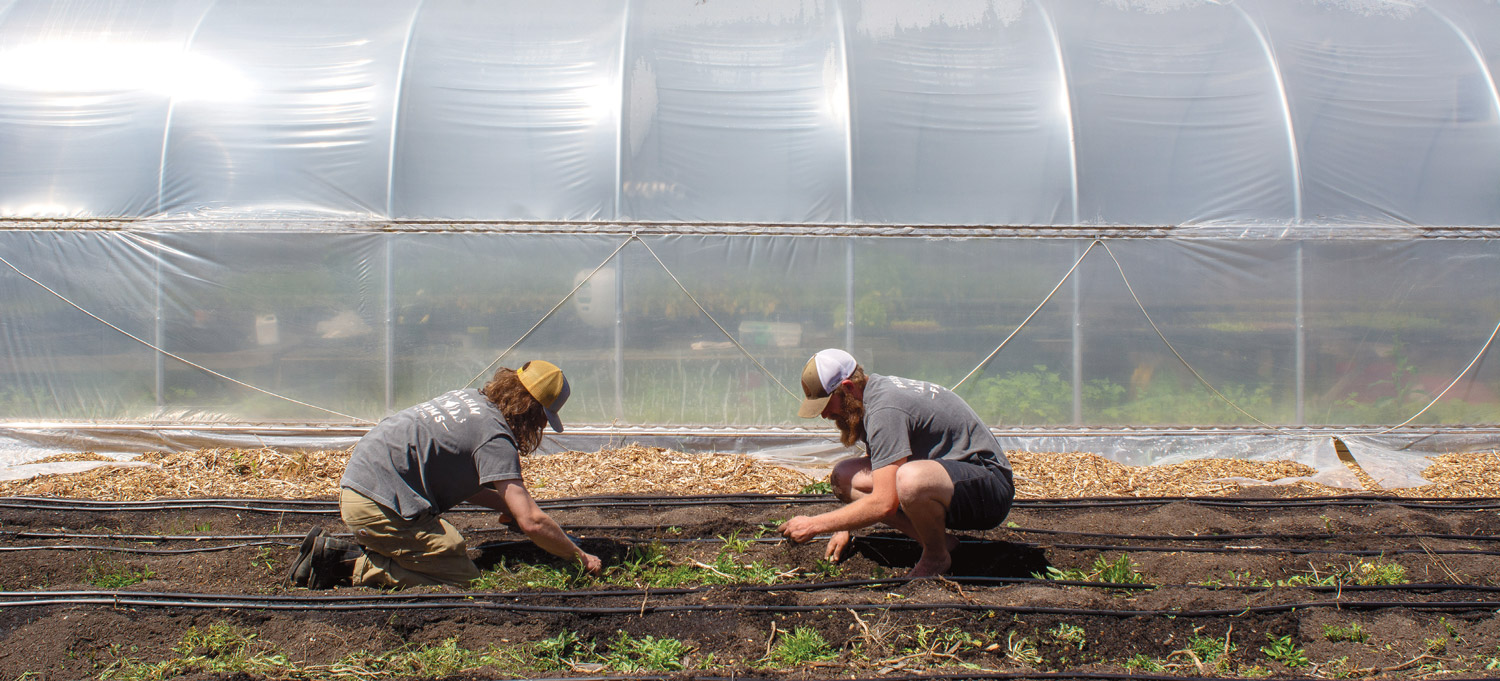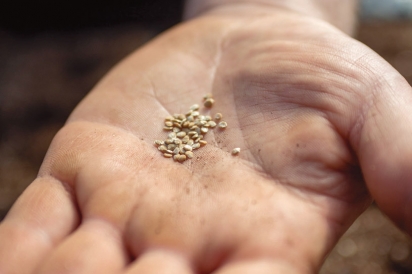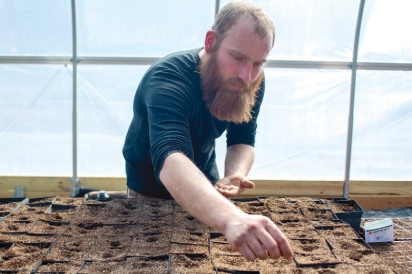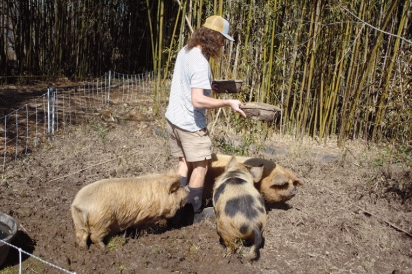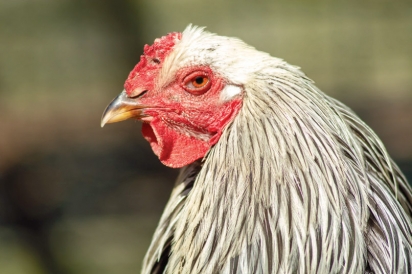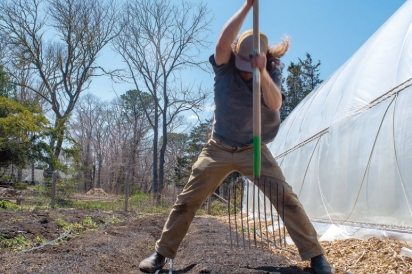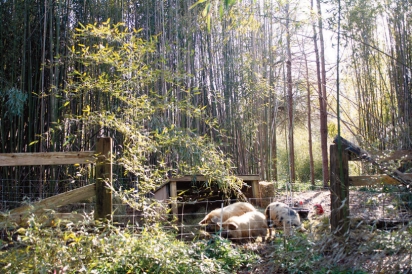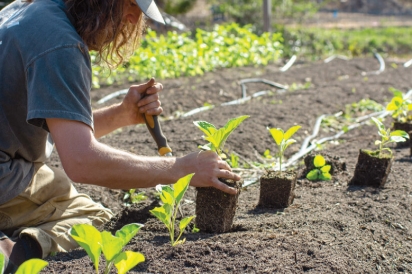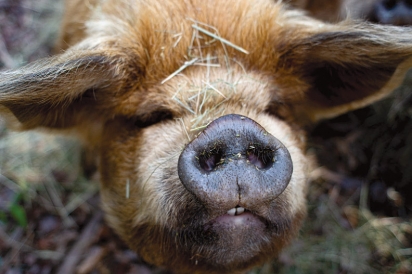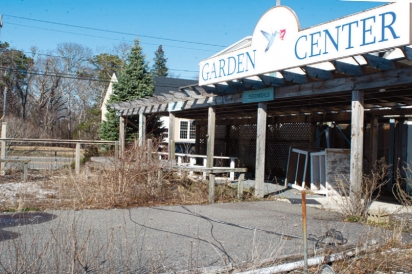Growing Pains: Building a Regenerative Farm on Cape Cod
Right now, we live in a country so divided that one side can be polarized from the other over something as simple and practical as a face covering. Closer to home, on this sandy peninsula jutting into the Atlantic Ocean, developers and environmentalists grapple over what both see as the future of the Cape. But on the mid Cape, two washashores, one a developer with deep pockets and the other a long-haired chef and farmer who touts the benefits of locally-sourced food and regenerative farming, are trying to come to terms with each other’s differing values and world views for mutual benefit. That they are father and son makes this story even more intriguing.
The developer is Dennis Leary, a former stockbroker, and a Florida real estate developer who, along with 11 other investors, has ventured $20 million on the Pelham House Resort in Dennis Port. Added to that, they have purchased and are renovating the Inn at Swan River in Dennis Port and the Commodore Inn in Harwich. The farmer is Dylan Leary, Dennis’s second oldest of seven, a graduate of the Culinary Institute of America, colloquially called the CIA. Dylan is farming and developing the 10-acre Pelham Farms in West Dennis. The ultimate goal for the farm is to first provide locally-sourced, nutritious food to the resort’s guests, then later for the community, with Dylan insisting it follow regenerative farming practices with an educational component.
It would be hyperbolic to paint the story unfolding at Pelham Farms in terms of the extremes: the Capitalist versus the Progressive. In this instance, father and son have mutual respect for one another. About his son, the elder Leary said, “He’s always been a very bright, inquisitive person who would take on whatever he was doing with intent and purpose.” Not considered the black sheep in the family; rather he’s viewed as the one who “always did his own thing.”
If there have been two constants in Dylan’s life, they would be food and service. As a seven-year-old, he was cooking pancake dinners for up to 40 people at annual family reunions. His parents still have the pint-sized chef’s coat and hat his godparents gave him to wear for those occasions. In high school he traveled to Costa Rica, Peru, and Uganda on service trips. Upon graduation, he enrolled at Northeastern University on a scholarship. “I was really into food, but because of societal pressure I thought I should go to a traditional college,” he said. In the chemical engineering honors program, he attempted to merge engineering with biology as a food science. “After a year my chemistry professor said to me, ‘Maybe I shouldn’t tell you this, but you’re in the wrong place.’”
It was his father who brought Dylan’s attention to the Culinary Institute of America, the alma mater of legendary Provincetown chef, culinary bon vivant, and all ‘round raconteur Anthony Bourdain. “I think everyone there had read Kitchen Confidential,” said Dylan. At the institute Dylan, to paraphrase the farmer’s saying, was as happy as a pig in mud. He could get a bachelor’s degree and a cooking education. His studies concentrated on applied food and within that included curriculum comprising farm to table. Along with learning the proper way to boil an egg and make killer mole, he indulged in topics like agricultural production, tillage, soil health, chef community relations, and regenerative agriculture.
At the Institute Dylan also was able to put his political values into action. He served as student body president. He interned at Apricot Lane Farm, the farm featured in the movie, The Biggest Little Farm. “I still consider Apricot Lane the best three months of my life. I came back from Apricot Lane excited about regenerative farming. I would love to duplicate on Pelham Farms with interns what I experienced there,” Dylan said.
It was at the Institute where Dylan sowed the seeds for a non-profit he had been dreaming of, People4Tomorrow, that culminated with a trip to Uganda where he and some cohorts taught regenerative principles. And it was at the Institute where Dylan met Nick Mathis, his college roommate and now his collaborator at Pelham Farms. Mathis originally came to help out for a month and stayed. “Dylan has the momentum going, and I want to do the same thing in Florida,” Mathis said.
If you were to see the two of them working together, you’d never know who was the farmer and who was the helper. They work side by side, and when decisions arise they consult with one another, pooling their shared knowledge. “We don’t have positions or titles,” said Dylan. “Right now, we both do the work, and he’ll be operations manager when we bring on people.”
Pelham Farms launched in July 2020 in much the same way Dorothy landed with a thud in the Land of Oz. A swirl of ideas, dreams, conversations, and dumb luck that took place over time dropped Dylan and Mathis one day on the perfect piece of land they had been hoping for, sans Wicked Witch, of course. At CIA Dylan and Mathis had had late night conversations about each owning their own regenerative farms. Dylan would constantly regale his family about his ideas and views on the importance of organic, regenerative food, and his low opinion of the corporate-driven food chain in America. While working in the kitchen at Pelham House Resort, Dylan was critical of the ingredients the resort was purchasing from standard large wholesale restaurant food distributors. He felt the food wasn’t living up to the business’s branding or potential.
During the COVID-19 lockdown, the Leary family clustered around its own dinner table in Florida. “We’ve always talked about having a family business, something philanthropic, something good for the environment,” said Dennis. “During COVID, we talked about long-term goals and what we wanted to accomplish as a family, and this farm seemed like a great place to start,” said Dennis.
Back on Cape Cod, the family shared their idea of a farm with Frank Hursey. Hursey is Dylan’s grandfather on his mother’s side and the inventor of QuickClot, a wound dressing that stops bleeding, with obvious implications for the military as well as civilian first aid. Hursey and Dennis are the sole financial backers of the farm. When Hursey heard their idea, much to their surprise he said he’s always wanted to own a farm. According to Dylan, his grandfather told him that while growing up in South Carolina he had some meaningful experiences in farming that changed the way he looked at food.
With a green light, Dylan and Mathis knew exactly what to do next. They had had their sights on the decrepit greenhouses at the former garden center at 621 Main Street in West Dennis. It was there they saw a sign for land for sale. They called the listing phone number and viewed the proposed land that very day. The land abutted the Garden Center and was exactly what they were looking for: seven-and-a-half acres on a former horse farm, complete with barn, greenhouse, outbuildings, pasture, a spring, wetlands, and a house that the Learys turned into a home for Dylan and an Airbnb, all for the bargain price of $690,000. Later the Learys purchased the two-and-a-half acres comprising the Garden Center situated in the business district for an additional $625,000.
That was late July 2020. Since then, Dylan and Mathis have been laying track in front of an oncoming locomotive, upgrading the farm’s infrastructure while attempting to meet the needs of the resort with an eye toward organic and regenerative best practices learned at CIA. The farm’s greenhouse was modernized with heat, a double layer of polypropylene plastic, and automated fans to control the internal temperature. An assortment of vegetables, including various types of tomato, basil, and pepper plants was started in January and were being moved outside into the ground. Dirt roads, laid and covered in wood chips acquired from local tree services, are now connecting the properties. One of the greenhouses on Main Street was made operational almost overnight and planted with hundreds of tomato plants. The pasture, rich from years of grazing horses, was first cleared and tilled by the farm’s three resident Kunekune pigs, then plowed and now garden rows are appearing. A fence to deter deer is in the works. The farm’s organically fed, diverse flock of fifty-some chickens will soon double in size to meet egg demand of the resort, preserve an ever-decreasing gene pool, and increase manure production for compost. Hugelkultur, a method where large sections of trees are buried under a berm of compost, is being used among the gardens. Dylan will plant bee and butterfly gardens along the tops, with vegetables like squash along the slopes.
Dylan had dreams that Pelham Farms would be phase two of People4Tomorrow, and was disappointed his father didn’t see a place for his non-profit on the farm in his more traditional business model. Still Dylan hasn’t taken his eye off the community. Currently the farm collects kitchen waste for composting from Pelham House Resort, Rory’s Market, and Family Table Collaborative, and he’s hoping to add more businesses. He’s envisioning opening waste drop-off for the entire Dennis community. He’s held the first of what he hopes will be many community days, where a handful of volunteers spent a morning spreading mulch and wood chips before being treated to a gourmet lunch courtesy of Chef Mathis. In a few years, the hope is the Main Street property will again be a retail outlet and gathering place sponsored by the farm.
“It all goes back to the soil,” explains Mathis. “We’re taking out of the soil, so the idea is to put back in the way nature would rebuild it without human interaction. Everyone talks about sustainability, but we want to increase the rate we put back in, hence the term, regenerative.”
There’s sustainability in the environmental sense, and there’s financial sustainability. “The first year with Dylan was tough,” said Dennis. “We went in with unrealistic expectations of what he could produce and what the Pelham needs were.
“It’s been an interesting conversation about the mission of the resort and the mission of the farm, and how do we pull those two together. Dylan really struggled. We had conversations about understanding a gradual movement toward the ultimate goal: Having a completely organic and regenerative sourcing of the Pelham House Resort menu. You don’t get there overnight. Growth comes in increments. If your goal is to produce a sustainable farm, it’s a contradiction to say you’re going to run a sustainable farm that’s not financially sustainable. Other people wouldn’t be able to replicate it.”
Dennis’ view is a tiered approach where first the customers at the resort who are willing to pay top dollar for top quality food will ultimately sustain the farm, then the farm’s produce will eventually be opened to the community. “I know the last thing Dylan wants to do is create beautiful food for rich people,” he said. Dennis’ Christian faith is very important to him. “There are biblical principles that tell you if you’re farming you should have a few extra rows for the widows and orphans, and I believe we can get there.” he said.
“I’ve always wanted to make things better for people,” Dylan said. Then, almost in embarrassment he says, “That sounds corny, doesn’t it?” It does only to someone who can’t see possibilities, and Dylan is very much in the mold of the people who believed in service to the country and joined the Peace Corps and VISTA during the Kennedy era. He was raised in a family with means and he’s not squandering what he’s been given. There’s another biblical quote in Luke that says, “To whom much is given, much will be required,” and Dylan seems to personify that sentiment.
“People are suffering because of bad systems,” he said. He cites how the pandemic exposed cracks in society, for example, how the consolidation to a few meat-packing plants caused a meat shortage. “We have big problems, but I think they’re solvable through nature. It’s all very hopeful and idealistic but it’s what we’re heading towards,” he said.
Mathis sees a system of hundreds of collaborative small farms with people making a good living and a strong food system. You have to remember that the first airplane flew 120 feet for 12 seconds. A 10-acre farm in West Dennis isn’t the end; it’s the beginning.
Pelham Farms
727-453-9150
pelhamfarms.com


